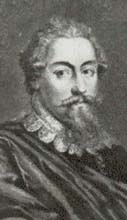 Francis Beaumont was born 1584, the son of Sir Francis Beaumont of Grace-Dieu, Leicestershire, a judge of the common pleas. He was educated at Broadgates Hall (now Pembroke College), Oxford, which he entered in 1597. On the death of his father in 1598, he left the university without a degree, and in 1600 became a member of the Inner Temple. The law, however, if he ever really studied it, was soon abandoned for poetry; and Beaumont became an intimate of Jonson and his circle at the Mermaid. His collaboration with Fletcher began early, and seems to have been brought about by personal preference, not, like most collaboration at that time, by the exigencies of the theatrical manager. Aubrey has preserved the tradition of their domestic intimacy and similarity of tastes. Their joint-production seems to have begun about 1605, and there is no evidence that Beaumont wrote any plays after 1612. About 1613 he married, and three years later died and was buried in Westminster Abbey. He had achieved a high contemporary reputation for his non-dramatic poetry, but he survives as a dramatist.
Francis Beaumont was born 1584, the son of Sir Francis Beaumont of Grace-Dieu, Leicestershire, a judge of the common pleas. He was educated at Broadgates Hall (now Pembroke College), Oxford, which he entered in 1597. On the death of his father in 1598, he left the university without a degree, and in 1600 became a member of the Inner Temple. The law, however, if he ever really studied it, was soon abandoned for poetry; and Beaumont became an intimate of Jonson and his circle at the Mermaid. His collaboration with Fletcher began early, and seems to have been brought about by personal preference, not, like most collaboration at that time, by the exigencies of the theatrical manager. Aubrey has preserved the tradition of their domestic intimacy and similarity of tastes. Their joint-production seems to have begun about 1605, and there is no evidence that Beaumont wrote any plays after 1612. About 1613 he married, and three years later died and was buried in Westminster Abbey. He had achieved a high contemporary reputation for his non-dramatic poetry, but he survives as a dramatist.
The Knight of the Burning Pestle was printed in quarto in 1613. A second and third quarto were issued in 1635, and the play was included in the second folio edition of Beaumont and Fletcher in 1679. The date of composition is uncertain, but recent opinion tends to place it about 1610. It cannot be said that there is as yet a general agreement as to the respective shares of the two authors in this comedy, but according to the most careful examination of the question so far made, that of Dr. Murch, most of the play should be ascribed to Beaumont, Fletcher having probably written only the three love scenes, I. i. 1-60; III. i.; and IV. iv. 18-93. In spite of the similarity between the satirical purpose of this play and of Don Quixote, it has not been shown that the authors had any knowledge of the work of Cervantes, or that they could read Spanish. (The first English translation of Don Quixote appeared in 1612.) In the mock-heroic part of the play, the object of the satire was the type of play founded upon medieval romance and popular at that time among the tradespeople of London; and of this type, Heywood's Four Prentices of London seems to have been especially in view. Koepple has pointed out the resemblance between the coffin scene in Act IV and an episode in Marston's Antonio and Mellida (1602). The love-plot is too commonplace to have a definitely assignable source, and the scenes between Merrythought and his wife, like those of the Induction, are, one may be sure, due to direct observation of contemporary life and manners.
The first quarto of Philaster, issued in 1620, seems to have been unauthorized, and to have been made up in part from a report taken down at a performance. At the beginning and end it is quite different from the other quartos. The play was probably written about 1608-10. The respective shares of the two authors are difficult to assign. Oliphant and Thorndike give to Fletcher I. i. 99-369; II. ii.; II. iv. 69-203; passages in III. ii.; V. iii.; and V. iv.; the rest to Beaumont; the prose scenes with less assurance. Macauley gives little beyond V. iii., iv. to Fletcher. This distribution is mainly on the grounds of the characteristics of the metre; it does not exclude the probability of intimate collaboration in plot and characterization. The story of the play seems to have been original, though several of the motives are common enough. There is marked indebtedness to Hamlet, and much resemblance to Cymbeline, though Thorndike has argued plausibly for the view that in the latter case Shakespeare was the borrower.
As in the case of Philaster, the first quarto of The Maid's Tragedy (1619) is corrupt and unauthorized. The date of composition is probably about 1609-11. There is more agreement here than in the case of Philaster as to the respective shares of the joint authors. Most critics give Fletcher II. ii; IV. i; V. i. 1-111; V. ii; the rest to Beaumont, with the exception of I. ii, which is uncertain. Macaulay gives II. ii. also to Beaumont. The source of the plot has not been found, though minor resemblances have been noted, such as that of the duel between Aspatia and Amintor, to the fight between Parthenia and Amphialus in Sidney's Arcadia, book iii, and that of the quarrel between Melantius and Amintor to that between Brutus and Cassius in Julius Caesar.
Purchase Books on Francis Beaumont
Search eBay! for Francis Beaumont collectibles